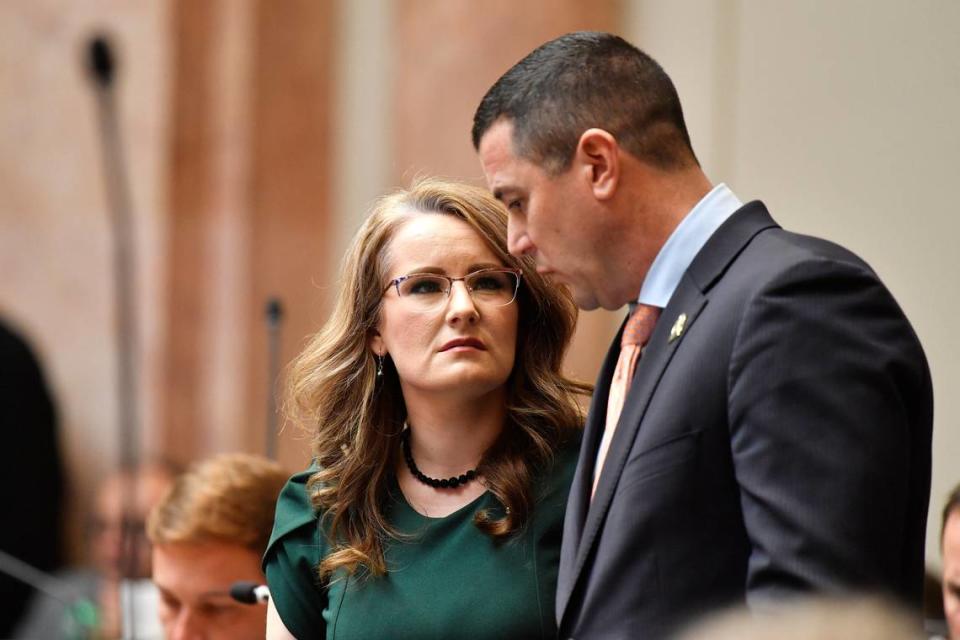As Cameron digs in on anti-trans rhetoric, some Republicans wonder if it’s too far
- Oops!Something went wrong.Please try again later.
- Oops!Something went wrong.Please try again later.
On the coattails of a legislative session defined by a raft of GOP-supported policies aimed at transgender youth, Kentucky Attorney General Daniel Cameron is relying on that party momentum in his race for the governor’s seat.
“Most people in Kentucky think that boys shouldn’t play girls’ sports, be in girls’ bathrooms, or that children should undergo sex change surgery before they turn 18,” Cameron said in a statement, echoing his campaign trail messaging.
He then criticized Beshear for posing in a 2020 photo with the Kentucky Chapter of the Sisters of Perpetual Indulgence, a group of satirical drag queens. “Andy Beshear literally stands with anti-Christian hate groups,” the Republican nominee said.
In a post-Roe v. Wade world, the GOP’s new social issue of choice is trans rights. Kentucky was one of at least 17 states during their most recent legislative sessions to enact restrictions on health care for trans people. Gov. Andy Beshear, Cameron’s opponent, vetoed the bill, but the Republican supermajority overrode him.
These positions from Beshear will “alienate swing voters,” according to Cameron. “Kentuckians are fed up with left-wing nonsense. I’ll bring back commonsense values.”
Though he is defending policies passed by members of his party — and appointed a champion of those laws, Henderson Republican Sen. Robby Mills, as his running mate — Cameron’s rhetoric on the campaign trail has aligned more with the party’s ideological extreme. And in a state whose Democratic governor continues to boast high approval ratings across political parties, some within the Republican party are questioning whether Cameron’s emphasis on socially divisive issues is a winning strategy for swing voters, whose support he needs.
“What I think he’s attempting to do is connect himself to (the legislature’s) efforts. Whether or not that’s going to be something that moves the dial in his direction remains to be seen,” Senate Bill 150 proponent Rep. Savannah Maddox, R-Dry Ridge said.

What’s more, in a state governed by a ruling party whose ideological tenets are individual liberty and freedom from government overreach, some in the GOP are chafing at passage of SB 150, which infringes on the liberty of parents to seek individualized medical care for their trans children — a type of care endorsed by major U.S. medical associations.
A lawsuit challenging this infringement is currently before the U.S. Sixth Circuit Court of Appeals.
Each of the lawmakers interviewed for this story said they supported at least a portion of SB 150, even if they ultimately voted against it. But most agreed: The current political characterizations of trans-rights issues, generally, leaves little room for the nuance they believe exists for many of their constituents. Many worry what the continued othering of a marginalized group will do to their party, long-term.
“I’m concerned for my party, because I worry this doesn’t portray us as compassionately as I know we are,” said Rep. Kim Moser, R-Taylor Mill. She was one of three Republicans in the House, all women, who voted against the final version of SB 150. Moser is one of 10 Republicans who spoke to the Herald-Leader for this story.
Rep. Stephanie Dietz of Edgewood, a second Northern Kentucky Republican who cast a “no” vote, said of Cameron’s messaging on trans issues, “there is an audience that wants to hear that message.
“But I think the majority in my district want to hear: What’s the plan to get our kids back on track with their education, what we’re going to do to increase our workforce, what are we going to do about affordable daycare?”

‘Kentucky voters are smarter than that’
Over the last month, Cameron’s messaging has shifted. His campaign recently aired an ad criticizing Beshear for his shutdown of schools and early release of inmates to lessen the overcrowding of jails during COVID-19. Another ad shows Cameron in a school hallway, criticizing Beshear for shutting down schools during the pandemic and vowing to help in “getting kids caught up.”
When asked whether Dietz thinks her party will continue in its pursuit of legislating trans issues, she said, “I’m hoping this was a one-time thing.”
“No one was supportive of minors having (gender transition) surgery. This legislation accomplished that,” she said. “I hope that, moving forward, we limit legislation on social issues affecting the LGBTQ community, unless it affects the health and safety of minors.”
Democrat Sen. Robin Webb of Grayson was the only member of her party to vote in favor SB 150 (she later voted against overriding Beshear’s veto). Rather than defend policies that are already law, Webb said, “I would rather see candidates for governor talk about how they’re going to solve problems we’re currently facing, or how they’re going to work with the legislature to solve problems that affect a majority of Kentuckians.”
Moser added, “I think Kentucky voters are smarter than that and are able to understand there is nuance in this. They’re more interested in having real conversations about what this means for real people, and making sure everyone gets the health care they need without persecuting one group.”

Rep. Killian Timoney, a Lexington Republican who voted against overriding Beshear’s veto, said “our issues in schools are about poverty, access to resources, attendance and truancy. I don’t believe the national-level narrative of gender identity issues are nearly as devastating to education.”
On the Senate floor in March, after he proposed an amendment to roll back a full-stop ban on gender-affirming care, State Sen. Danny Carroll, R-Benton, asked his colleagues, “when are we going to get past all this extremism, all this radicalism?” Carroll declined a request to be interviewed for this story.
‘He represents the majority opinion’
Some Republicans, particularly those who offering full-throated endorsement of the policies Cameron and Mills are defending, continue to be emboldened.
Sen. Lindsey Tichenor, R-Smithfield champion of SB 150 and lead sponsor of an unsuccessful bill to ban drag performances in public spaces, said the policies Cameron is touting don’t just impact his base. They “affect the daughters and granddaughters of both Democrats and Republicans who are being robbed of scholarship opportunities and their privacy,” she said in a statement.
“It affects the children and grandchildren who are being led down a path toward destructive ideology with no return. Daniel Cameron’s position on these matters are valuable because he represents the majority opinion across the commonwealth.”
Rep. Josh Calloway, R-Irvington, a staunch supporter of SB 150 and of the earlier, more extreme House Bill 470 (it additionally sought to outlaw affirming health care and mental health services for trans youth), applauds Cameron’s campaign strategy.
“I encouraged the Cameron campaign to highlight this issue and point to the fact that Beshear vetoed the Save Women’s Sports bill and Senate Bill 150, because I believe, in Kentucky, it’s a winning issue,” Calloway said in an interview.
A divisive figure among some in his caucus for characterizing a culture that affirms LGBTQ identities as trying to “mainstream minor perversion” and one that has “the clear mark of Satanic influence,” Calloway finds a lot of commonalities between himself and Cameron.
He gets why some in his party are worried this messaging may alienate a portion of the electorate. But he’s not easily dissuaded from a path he believes the GOP should continue down, just because they may lose swing votes.
“It is a concern of mine, but it’s a concern because that is not the direction I am headed with my life, my family, or the direction I want our society to go in,” he said. “I have no desire to say, let me soften on this issue because I might push away a voter. It may eliminate swaths of voters out there, but they are going to have to get bigger than we are,” he said, in order to knock the party off its current course.
Were Cameron to see defeat, Calloway said he wouldn’t view that loss as a referendum on the GOP’s approach to trans policies, and it won’t dampen his spirit to continue filing bills to combat woke ideology, which he plans to do next session.
“If Daniel Cameron doesn’t win, it will send the message that the people of Kentucky are nervous,” he said. That “they’re a bit on edge about change and the direction we’re going to go, and how quickly we’re going to go there.”

